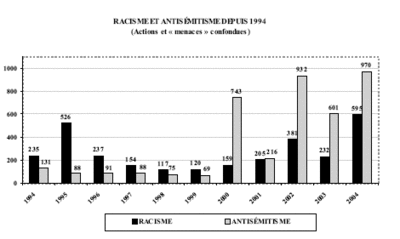Franco-Israeli Détente?
The turning point was the second Intifada. Of course, France took the side of the Palestinians in this ferocious war of attrition.
But for the first time France’s relentless pro-Palestinianism had disastrous consequences for France itself. Encouraged by the French positions, carried away by the hatred of Sharon expressed in the medias, many French Arabs permitted themselves to pass over… to an active anti-Semitism. There was an explosion of anti-Semitic incidents, hundred of French Jews were attacked, synagogues were set on fire, etc…
Paradoxically, it was these wretched creatures – who so thoroughly identified with the Palestinians – who finished off the extremist pro-Palestinianism of French policy.
The great majority of French political leaders and journalists recognized the outrage that the explosion of anti-Semitism represented for France: it was unacceptable that French citizens were attacked in this way; France stood accused, notably in the United States; one feared a clash between [religious] communities. They reacted firmly and the attitude of the French government, notably, has been exemplary, as Sharon acknowledged today [yesterday]….
I’m afraid I do not share the optimism of Emmanuel’s assessment. There are important indices suggesting that the entire visit is being exploited by the French government as a publicity stunt designed precisely to highlight the alleged “success” of its supposed efforts to combat anti-Semitism. Thus, just one day before Sharon’s arrival in Paris, the French Ministry of the Interior announced that anti-Semitic incidents in France had fallen by some 48% by comparison to the first-half of 2004. Incidentally, the official organism charged with collecting such statistics – the Consultative Commission on Human Rights (CNCDH) – does not publish any mid-year report, so we have to take this piece of information on faith. In any case, the release of the statistic had the presumably desired effect, it being cited in virtually all the reporting on Sharon’s visit, including – which is no doubt of greatest importance for the French government – in the English language reports. (See, for instance, this Reuters article.) Following his meeting with Chirac, Ariel Sharon dutifully praised France’s “very decided combat against anti-Semitism” and even suggested that France could be a “model” for other countries in the matter.
But the problem with all this diplomatic good cheer is that the 48% drop in anti-Semitic incidents represents a highly relative “success” – notably in light of the fact that the first half of 2004 saw a massive spike in such incidents (which already were on the decline again in the second half of 2004). This is to say that with the 48% drop, what Emmanuel calls “active anti-Semitism” in France has merely returned to the already alarmingly high level of 2003 (during which, according to the official statistics, some 601 such incidents were recorded). Moreover, there is nothing to suggest that the recent decline has anything to do with any policy of the French government. For the last five years, since the start of the second Intifada, the number of anti-Semitic incidents in France, although showing an overall rising tendency, has oscillated from year to year. These oscillations presumably reflect changes in the more general political climate and not any specific measures taken by the government. Below is a relevant chart taken from the CNCDH’s latest yearly report [pdf-file; link in French]. The grey bar represents anti-Semitic incidents; the black bar, other racist incidents.

It is also worth noting that in his official declaration prior to the meeting with Sharon, Jacques Chirac welcomed the Israeli withdrawal from Gaza, but placed the latter within the framework of the "road map". Ariel Sharon, by contrast, insists that the "road map" cannot even begin to be applied until "there is a total stop to terrorism" (these his words in a recent interview with Le Monde). The withdrawal from Gaza thus forms part of a "preliminary phase". Chirac's divergence from Sharon on this point is more than just a nuance. It expresses a continuing indulgence of Palestinian terror on the part of Chirac and the French government - who, of course, can far more easily afford such indulgence than Ariel Sharon and the Israelis.


<< Home